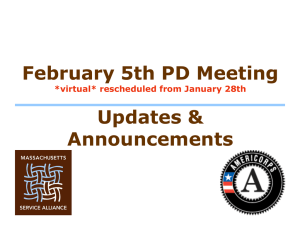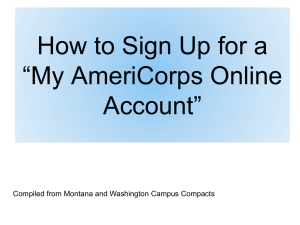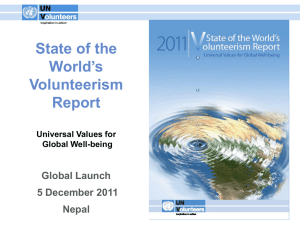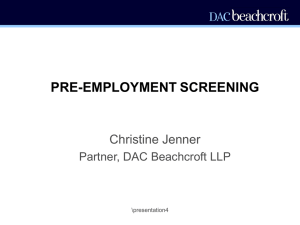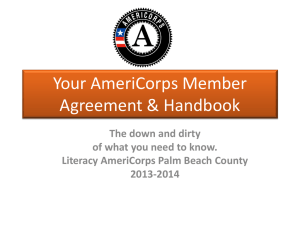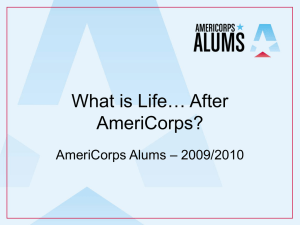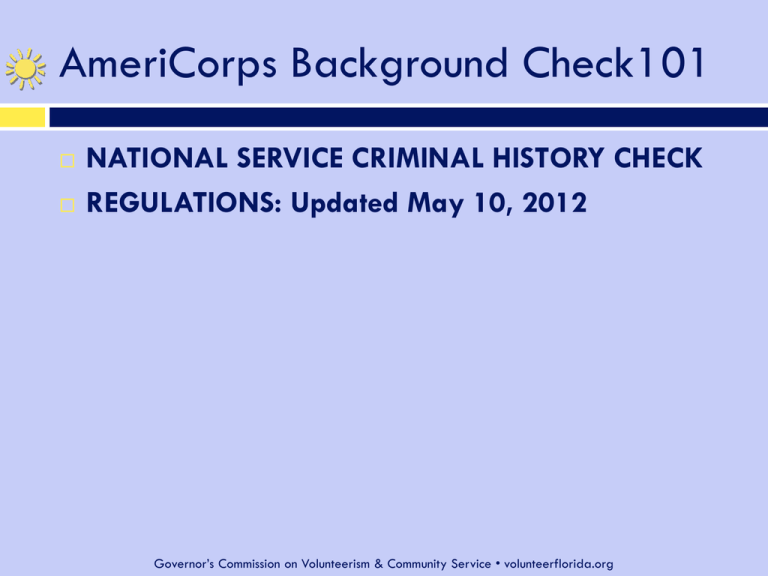
AmeriCorps Background Check101
NATIONAL SERVICE CRIMINAL HISTORY CHECK
REGULATIONS: Updated May 10, 2012
Governor’s Commission on Volunteerism & Community Service • volunteerflorida.org
AmeriCorps Background Check101
SECTIONS
Programs Covered by the Law and Regulations
Individuals Subject to a National Service Criminal History Check
National Sex Offender Public Registry
Statewide Criminal History
Federal Bureau of Investigation Criminal History Records
How to Perform a National Service Criminal History Check
How to Document a National Service Criminal History Check
Results that Prohibit Individuals from Serving
Costs and Compliance Risks
Alternative Search Procedure
Schools that Perform Criminal History Checks
Governor’s Commission on Volunteerism & Community Service • volunteerflorida.org
AmeriCorps Background Check101
Since November 23, 2007, the Corporation for
National and Community Service (CNCS) has had
regulations setting requirements for grantees to
perform a Check on individuals with recurring
access to a vulnerable population.
Governor’s Commission on Volunteerism & Community Service • volunteerflorida.org
AmeriCorps Background Check101
On October 1, 2009, regulations went into effect
implementing Section 189D of the National and
Community Service Act of 1990, as amended,
expanding the Check to include any individual
receiving a living allowance, stipend, national
service education award, or salary through a
program receiving assistance under national service
laws, regardless of their level of contact with a
vulnerable population.
Governor’s Commission on Volunteerism & Community Service • volunteerflorida.org
AmeriCorps Background Check101
The regulations and our guidelines establish criminal history check procedures
requiring that national service grantees perform checks which involve:
Verification of identity using government photo identification;
Obtaining written authorization from the individual to perform the check;
Documenting candidates understanding of the check requirements;
Determining what types of checks are required for each individual and
from where they are to be obtained;
Paying for the checks;
Governor’s Commission on Volunteerism & Community Service • volunteerflorida.org
AmeriCorps Background Check101
Continued list
Ensuring that a sex offender search is performed before service/work
begins;
Initiating criminal history information check(s) no later than the start of
service/work
Providing candidates with opportunity for review of findings;
Keeping information confidential;
Accompaniment of anyone with a pending check when in contact with
vulnerable populations;
Maintaining check records;
Documenting that checks were performed and considered in selection
Governor’s Commission on Volunteerism & Community Service • volunteerflorida.org
AmeriCorps Background Check101
What is a National Service Criminal History
Check?
A National Service Criminal History Check has two
components established by law and regulation that
CNCS grantees must conduct on individuals in
covered positions.
Governor’s Commission on Volunteerism & Community Service • volunteerflorida.org
AmeriCorps Background Check101
A covered position is one in which an individual
receives:
a living allowance,
stipend,
education award,
salary,
or other remuneration through a national service
program.
Governor’s Commission on Volunteerism & Community Service • volunteerflorida.org
AmeriCorps Background Check101
The Check consists of two components:
A nationwide name-based check of the National Sex Offender
Public Registry -(NSOPR also known as NSOPW), which
consists of a web-based check of a centralized system which
identifies individuals who are registered as sex offenders in
States, territories, or with many federally recognized Tribes;
and…Either a name- or fingerprint-based search of the
statewide criminal history registry in the candidate's State
of residence and in the State where the individual will serve or
work; OR a name- or fingerprint-based FBI check.
Governor’s Commission on Volunteerism & Community Service • volunteerflorida.org
AmeriCorps Background Check101
What is the definition of vulnerable population?
Vulnerable populations include children age 17 or younger,
persons age 60 and older, and/or individuals with
disabilities. "Individuals with disabilities" has the same meaning
given to the term in the Rehabilitation Act in 29
U.S.C. 705(20)(B), and includes any person who has a physical
or mental impairment which substantially limits one or more
major life activities, has a record of such an impairment, or is
regarded as having such an impairment.
Governor’s Commission on Volunteerism & Community Service • volunteerflorida.org
AmeriCorps Background Check101
What is the definition of recurring access?
Recurring access is defined as "the ability on more
than one occasion to approach, observe, or
communicate with, an individual, through physical
proximity or other means, including but not limited
to, electronic or telephonic communication." (45 CFR
2510.20).
Governor’s Commission on Volunteerism & Community Service • volunteerflorida.org
AmeriCorps Background Check101
Are grantees required to perform the checks in a particular manner or
include any other screening mechanisms?
What steps are required to perform the checks? The Check required by
CNCS is only part of the overall applicant screening process which every
grantee must develop. Grantee policies must include the screening methods
and eligibility criteria in the regulation in order to meet CNCS's
requirements. Additionally, the applicant screening process must address
how you will handle any circumstances unique to your program. This process
may include interviews and personal reference checks. Grantees may
develop written criminal history check policies and procedures that meet
CNCS's rules and address how any unique circumstances that your program
faces are to be handled. Grantee policies that do not comply with the
minimum standards and requirements set out in CNCS's regulations require
approval of an alternative search procedure (ASP) under 45 CFR §§
2540.206, 2551.31, and 2552.31.
Governor’s Commission on Volunteerism & Community Service • volunteerflorida.org
AmeriCorps Background Check101
Is a background check the same as a criminal history check?
No. The term background check is used to describe an
individual's personal information, which might or might not
include criminal history, credit, references, and so forth. The
National Service Criminal History Check requires that the
program, at a minimum, obtain information on criminal offense
convictions in the State where candidates last resided, the
State where they will perform service or work, and to conduct
a nationwide search of the NSOPR.
Governor’s Commission on Volunteerism & Community Service • volunteerflorida.org
AmeriCorps Background Check101
I am being told that my organization is not eligible to receive a criminal
history check because we are clearing individuals for employment,
what do I do?
You should provide the following explanation: A National Service Criminal
History Check is not a check to approve employment; it is to clear someone
to perform service under a national service grant program, it is not a check
to reach an employment decision. You can employ someone but they may
be prohibited from working under a CNCS grant program. If you continue
to be blocked from access to the required checks, contact CNCS regarding
an alternate search procedure (ASP).
Governor’s Commission on Volunteerism & Community Service • volunteerflorida.org
AmeriCorps Background Check101
When the State registry offers name-based or fingerprintbased check options for searching for criminal history
information, what should I consider when making a choice?
Either check is acceptable as long as you ensure that the type of
check you select is a statewide, all-offense, allrecords search.
Some States offer abbreviated checks that return limited types
of offenses (e.g. felony-only searches) or search only an
abridged system of records. Such searches are not
acceptable.
Governor’s Commission on Volunteerism & Community Service • volunteerflorida.org
AmeriCorps Background Check101
Name-based record checks use biographic information (name, date of
birth, sex and social security numbers).
This is not the most reliable way of obtaining a criminal history record.
Name-based checks can result in false
positives (records are falsely attributed to the individual) or false negatives
(records belonging to the individual
are not identified), consuming staff time to verify hits. Fingerprint-based
searches use the unique prints of the
person and are the most reliable method of obtaining criminal history
records. Typically, fingerprint-based
searches are more costly than name-based, but state agencies may offer
discounts for non-profit and volunteer
organizations.
Governor’s Commission on Volunteerism & Community Service • volunteerflorida.org
AmeriCorps Background Check101
When the regulations change, are the requirements retroactive? Do we
need to conduct a new Check on individuals already serving or working
to meet the new requirements?
The Check conducted on individuals in covered positions has always been
based on the rule in effect at the time the individual enrolled in or was
hired by the program. As long as the Check is conducted appropriately
conducted based on the rules in effect at the time an individual is hired or
enrolled, Y()U are not required to recheck or supplement the individual's
Check unless the individual re-enrolls after a break service.
Governor’s Commission on Volunteerism & Community Service • volunteerflorida.org
AmeriCorps Background Check101
Name-based record checks use biographic information (name, date of
birth, sex and social security numbers).
This is not the most reliable way of obtaining a criminal history record.
Name-based checks can result in false
positives (records are falsely attributed to the individual) or false negatives
(records belonging to the individual
are not identified), consuming staff time to verify hits. Fingerprint-based
searches use the unique prints of the
person and are the most reliable method of obtaining criminal history
records. Typically, fingerprint-based
searches are more costly than name-based, but state agencies may offer
discounts for non-profit and volunteer
organizations.
Governor’s Commission on Volunteerism & Community Service • volunteerflorida.org

